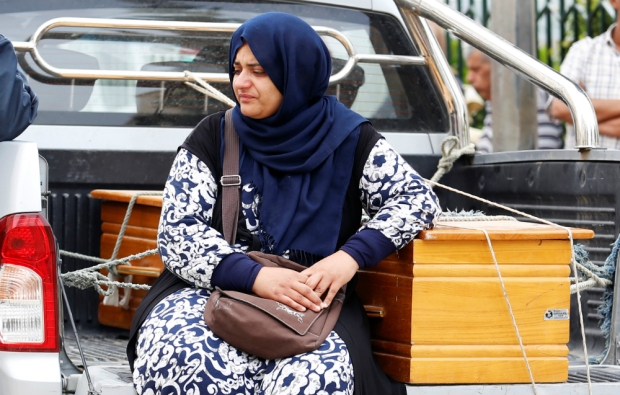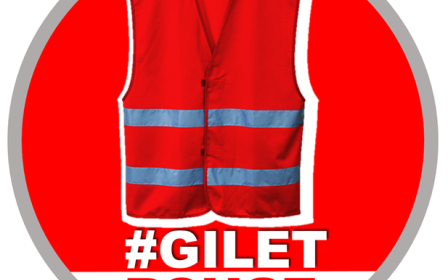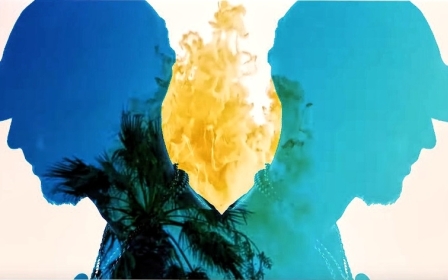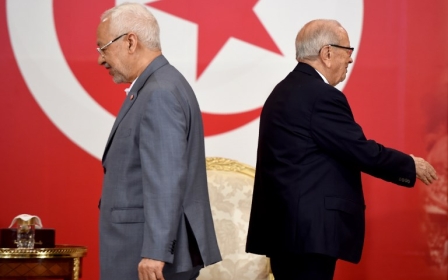'Thinking of harqa': Why young Tunisians are still leaving, eight years after Ben Ali
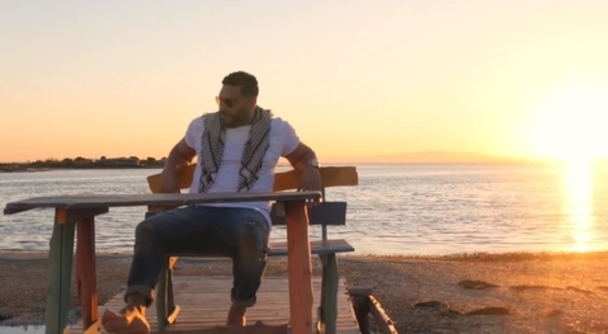
On 14 January 2011, former Tunisian President Zine El Abidine Ben Ali fled the North African country, after a month of mass protests ended his 23-year autocratic rule.
Many of those who took to the streets in 2011 were in their teens or their early twenties and dreamed that the revolution they had helped to spark would bring freedom and opportunities in its wake.
Eight years later, Tunisians of the same age still dream of building better futures for themselves. But rising numbers are now risking their lives in search of that future on boats crossing the Mediterranean Sea to Europe.
Between 2000 to 2010, the annual number average of arrivals from Tunisia at Italian sea borders was just under 2,000 people, according to the Migration Policy Centre.
In 2011, that number increased to over 28,000, falling back to about 2,000 the following year. But figures compiled by the UN’s refugee agency, the UNHCR, suggest that the numbers are creeping up again, with around 5,000 people reaching Italy in 2018.
The harqa
In Tunisia, the journey to Europe, typically by boat, is commonly referred to as the "harqa".
It is widely spoken about, and it is not uncommon for the majority of Tunisians to know at least one relative, neighbour or friend who has attempted the journey.
“My brother attempted the harqa five times,” 20-year-old Yousra, from the northern city of Bizerte, told Middle East Eye.
“He was arrested during many attempts, and on one attempt, the smugglers ran away with his money, which was about 2,500 Tunisian dinars ($846).”
A search on social media brings up several Facebook pages encouraging young Tunisians to undertake the harqa, and even acting as message boards for those serious about making the perilous Mediterranean crossing.
“How do I convince you that this boat is the solution, mum” reads one post showing an image of an overcrowded dinghy in the sea.
Another reads: “We’ve been tortured and mistreated in our country, we’ve had enough, we’re tired and now we’re leaving. Either we reach our destination, or we die trying.”
Some visitors to these pages appear to need little convincing. “Let me know when the next trip is. Count me in,” one post reads.
Others leave their numbers and advertise their own services: “Who’s ready and wants to leave this country, there’s something good in the coming days, message me privately if you want to come.”
MEE has not been able to verify whether these posts are genuine and had not received a response to queries emailed to a contact address on the above Facebook page at the time of publication.
But they are typical examples of the sort of posts that young Tunisians tempted by the harqa might find online.
Sprawled across these pages are images of boats, ferries, the sea and postcard images of European cities.
An online search for harqa also brings up videos of young men filming their journeys aboard small rubber dinghies in the middle of the ocean.
The dinghies are packed with people waving at the camera, smiling and singing cheerily about leaving the country.
The singing and laughing only slightly masks the sound of the sputtering engine. Some of these videos also feature women and young children.
Pop culture
Beyond social media, harqa is also referred to commonly in Tunisian pop culture. Several rap songs and music videos tackling the issue have been made by Tunisian artists.
The most popular is the song Wala Lela by the well-known artist ‘Balti’. He starts the song with the line “I’m thinking of harqa it’s on my mind. Shall I do it or not?”
He goes on to tell an all too familiar story of young Tunisians being sold the dream of Rome and Paris and risking their lives to get there. The song has over 61 million views on YouTube to date.
In 2018, the UNHCR reported that Tunisians made up the highest number of irregular migrants arriving in Italy.
International Organisation for Migration (IOM) data shows the number of Tunisians arriving in Italy via irregular routes increasing from less than 1,000 in 2013, to more than 6,000 in 2017, dropping back to just under 5,000 in 2018.
In 2018, Tunisia was the country of departure for almost a quarter of migrants reaching Europe, compared with four percent in 2017, although this was mainly a consequence of a sharp decrease in the number of departures from Libyan shores.
Yousra’s 21-year-old brother, who she did not want to name, is now living in France, but she explained that his successful attempt came after a lot of hardship.
“My brother called us from Italy after we hadn’t heard from him in weeks. My mother had fallen sick worrying about him. We all thought he had died,” Yousra explained.
Yousra said that her brother told her that he had been held in prison in Sicily for 14 days and had complained about his treatment by police.
Dangerous voyage
He also described to her the dangers he had faced during his voyage across the Mediterranean.
“The boat he was in with a few friends started taking in water before they reached mainland Italy. My brother jumped off the boat to swim to the closest island of Marettimo rather than stay in the middle of the sea on a sinking boat,” Yousra said.
Marettimo is a small island about 15 kilometres to the west of Sicily. While swimming to the shore, Yusra’s brother injured his leg on a rock, she said.
He told her subsequently that he had broken a bone in his leg and was bleeding from his injuries.
“He was washed up on the shore… and lost consciousness. His friends abandoned him,” she said.
While Yousra’s brother survived and recovered from his injuries, others are not so fortunate.
According to the IOM, nearly half of at least 14,795 men, women and children confirmed to have died while trying to reach Europe between 2014 and 2018 did so while crossing the Central Mediterranean route between North Africa and Italy.
In June, 112 people, most of them Tunisian, died after a boat carrying around 180 migrants sank off the coast of Tunisia. It was the single biggest incident of dead and missing people in the Mediterranean last year.
Despite these dangers, young Tunisians like Yousra’s brother continue to attempt the harqa, knowing, and sometimes having already experienced, the risks involved.
Lack of opportunities
In many posts on social media encouraging the harqa, young Tunisians express frustration with the chronically poor state of the economy and lack of opportunities open to them.
A study conducted by REACH, a Geneva-based humanitarian NGO, found that the three most commonly reported factors given by Tunisians as reasons to leave, were “socio-economic performance, persisting unemployment and the political crisis”.
Social inequalities were also given as a reason by many Tunisians.
Tunisians have been complaining about rising food prices in recent years because of a weak currency and dramatically accelerating inflation, which in 2018 reached the highest level since 1990, according to Reuters.
Joblessness is also a problem, with the unemployment rate currently standing at 15.5 percent, higher than the average for the last decade.
Young people and women have been the most affected by the lack of opportunity, with youth unemployment remaining stubbornly high, particularly among university graduates.
One-third of graduates are unemployed, and many feel they are left with few options.
In October, the country was shaken after a suicide bomber detonated a device in the centre of the capital, Tunis, killing herself and wounding nine others.
Though initial investigations focused on whether the incident was a militant attack, authorities later said the bomber had no religious or political affiliations, and was not on an extremist watch list.
Tunisian media later reported that the bomber was 30-year-old Mouna Guebla, an unemployed graduate with a degree in English. Reports said Guebla had resorted to looking after sheep on her family’s farm after spending three years searching for a job without success.
Chronic unemployment
Unemployment is considered one of the main reasons for the mass protests that broke out in 2010 and led to the fall of Ben Ali.
The protests were sparked by the actions of a jobless 26-year-old, Mohamed Bouazizi, who set himself on fire outside the local municipality in protest over rising food prices and unemployment.
Since then, some have styled Tunisia as a success story of the Arab Spring, where democracy has blossomed in place of a decades-long dictatorship.
“Tunisia has progressed significantly since Ben Ali’s rule in terms of its political transition towards a democratic system,” said Mohamed Ali Azaiez, an adviser at the ministry of development, investment and international cooperation.
In May last year, the country held its first free municipal elections since Ben Ali was removed after being delayed several times. The elections produced the first female mayor of Tunisia’s capital in 160 years, Souad Abderrahim.
“The new constitution was also something we were proud of, as it introduced laws furthering the rights of women and minorities.”
A new law criminalising racial discrimination was introduced in October last year, making Tunisia the first country in the Middle East and North Africa to do so.
Yet, for many young Tunisians, political freedom alone is not enough.
“Freedom isn’t enough without economic reform and more opportunities for the youth,” said Yousra.
“It’s been eight years since we removed Ben Ali, but families are still losing their sons and brothers to harqa. More needs to be done.”
This article is available in French on Middle East Eye French edition.
New MEE newsletter: Jerusalem Dispatch
Sign up to get the latest insights and analysis on Israel-Palestine, alongside Turkey Unpacked and other MEE newsletters
Middle East Eye delivers independent and unrivalled coverage and analysis of the Middle East, North Africa and beyond. To learn more about republishing this content and the associated fees, please fill out this form. More about MEE can be found here.


